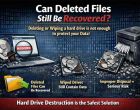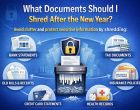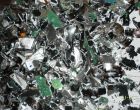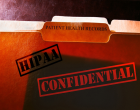Electronic vs. Paper Records: Best Practices for Secure Disposal
Protecting Your Business Starts with Knowing the Risks
Businesses collect and store tons of information on paper and computers. These records may include employee files, customer data, medical records, or financial documents. The information must be handled carefully, but when the records are no longer required, you are responsible for properly disposing of this sensitive information. Failure to do so puts your organization at risk of data breaches, legal trouble, and loss of client trust. Understanding how to destroy records securely is just as important as knowing how to store them. You need a secure disposal method to protect sensitive information and comply with applicable regulations like HIPAA and FACTA. Choosing a professional records destruction and management company is the best way to help you maintain compliance.
Managing Paper Records Before and After Use
Like many others, your office may rely on paper records for essential files. HR forms, client contracts, medical charts, invoices, and more tend to pile up quickly and can cause an avalanche if you aren’t careful! Here are the best practices for handling paper records:
- Current paper records: Keep paper records secure by using locked filing systems and restricting access to authorized personnel.
- Old paper records: Avoid dumping these documents in a trash can or recycling bin. Partner with a professional shredding service that offers on-site and off-site shredding and a Certificate of Destruction for your records.
Managing Digital Records: More Storage Equals New Security Concerns
Electronic records are quickly becoming the norm for many industries. They are easier to store, search, and back up. Yet, they are not without risks. Consider these best practices for your electronic records:
- Current electronic records: Utilize strong cybersecurity practices for your hard drives, servers, and cloud systems. Ensure you train your team regularly on how to keep data thieves away.
- Old electronic records: Simply deleting electronic folders from computers doesn’t mean the data is gone. Information can be recovered with the right software. Use a trusted hard drive and media destruction company to properly destroy hard drives, USBs, CDs, and other electronic media.
Why Both Formats Require Serious Security
The end goal is the same whether you store your records on paper or electronically. You must protect your sensitive information from exposure. Some businesses assume paper records are low-risk because they must be physically stolen and carried away. Others look at deleting files as an acceptable solution for digital data. Regulations like HIPAA, FACTA, and GLBA require secure destruction of certain records. Failure to follow them could lead to costly fines or lawsuits. A professional information management company can help you alleviate many headaches by setting a clear retention schedule and destruction policy, advising on how long to keep each type of record, and when to destroy them securely.
Crown Information Management Handles Records Disposal for You
Handling secure disposal on your own can be time-consuming and stressful. At Crown Information Management, we offer full-service solutions for your paper and electronic records, including routine shredding, one-time purge services, secure digital media destruction, and document storage and indexing. Our services meet the highest security standards and include a Certificate of Destruction for your records. Don’t take chances with sensitive information when dealing with stacks of paper or aging hard drives. Secure disposal is part of innovative business management, and it’s easier than you think with Crown Information Management on your side.
For experienced help with media destruction, scanning, indexing, shredding, records management, and document storage, call Crown Information Management. You can reach us at 800-979-9545 or contact us online to learn more about our services. Put our team to work for you. We are a SOC1, NAID AAA, and PCI-certified company.






